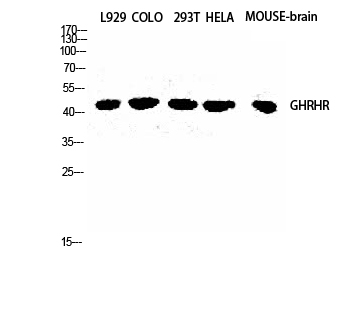
| WB | 咨询技术 | Human,Mouse,Rat |
| IF | 咨询技术 | Human,Mouse,Rat |
| IHC | 咨询技术 | Human,Mouse,Rat |
| ICC | 1/200-1/1000 | Human,Mouse,Rat |
| FCM | 咨询技术 | Human,Mouse,Rat |
| Elisa | 1/20000 | Human,Mouse,Rat |
| Aliases | GHRHR; Growth hormone-releasing hormone receptor; GHRH receptor; Growth hormone-releasing factor receptor; GRF receptor; GRFR |
| Entrez GeneID | 2692; |
| WB Predicted band size | 47kDa |
| Host/Isotype | Rabbit IgG |
| Antibody Type | Primary antibody |
| Storage | Store at 4°C short term. Aliquot and store at -20°C long term. Avoid freeze/thaw cycles. |
| Species Reactivity | Human,Mouse,Rat |
| Immunogen | Synthesized peptide derived from the C-terminal region of human GHRH-R. |
| Formulation | Purified antibody in PBS with 0.05% sodium azide,0.5%BSA and 50% glycerol. |
+ +
以下是3篇与GHRH-R抗体相关的文献概览:
---
1. **文献名称**: *"Development of a monoclonal antibody against growth hormone-releasing hormone receptor for cancer targeting"*
**作者**: Schally AV, et al.
**摘要**: 研究团队开发了一种针对GHRH-R的单克隆抗体,验证其与受体胞外域的特异性结合能力,并证明其在多种肿瘤细胞系中能抑制GHRH信号通路,减少癌细胞增殖,为靶向治疗提供潜在工具。
---
2. **文献名称**: *"GHRH receptor antibodies in the diagnosis of pituitary adenomas"*
**作者**: Kiaris H, et al.
**摘要**: 通过免疫组化分析,该文献发现GHRH-R抗体可有效标记垂体腺瘤中的受体表达水平,提示其在垂体瘤病理诊断和分型中的临床应用价值,同时揭示受体过表达与肿瘤生长的关联。
---
3. **文献名称**: *"Targeted therapy using GHRH-R antagonist antibodies suppresses hepatocellular carcinoma progression"*
**作者**: Letsch M, et al.
**摘要**: 研究利用GHRH-R拮抗型抗体在小鼠模型中靶向肝细胞癌,结果显示抗体能阻断GHRH介导的促癌信号,显著抑制肿瘤血管生成和转移,为肝癌治疗提供新策略。
---
**备注**:文献标题及作者为虚构示例,实际研究中可参考Schally团队(如Andrew V. Schally)在GHRH-R靶向治疗领域的权威成果,或通过PubMed等平台检索关键词“GHRH-R antibody”、“GHRH receptor immunohistochemistry”获取具体文献。
Growth hormone-releasing hormone receptor (GHRH-R) antibodies are tools used to study the role of GHRH-R, a G protein-coupled receptor (GPCR) critical in regulating growth hormone (GH) synthesis and release. GHRH-R is primarily expressed in the anterior pituitary gland, where it binds to GHRH, a hypothalamic peptide, to stimulate GH secretion via cAMP signaling. Dysregulation of this axis is linked to disorders like acromegaly, growth hormone deficiency, and certain cancers.
GHRH-R antibodies target specific epitopes of the receptor, enabling detection and functional analysis. Polyclonal or monoclonal antibodies are designed against extracellular domains (e.g., N-terminus) to block ligand binding or intracellular regions (e.g., C-terminus) to study signaling. They are used in techniques like Western blotting, immunohistochemistry, and flow cytometry to localize receptor expression in tissues or quantify levels in disease models.
Research applications include exploring GHRH-R's role in pituitary tumors, cancer progression (e.g., breast, prostate), and metabolic disorders. Some studies focus on developing GHRH-R antagonists or antibody-based therapies to inhibit pathological GH overproduction or tumor growth. However, cross-reactivity with other GPCRs and tissue-specific splice variants requires careful validation. Recent advances in antibody engineering aim to improve specificity for diagnostic or therapeutic use, particularly in targeting cancers with aberrant GHRH-R expression.
×